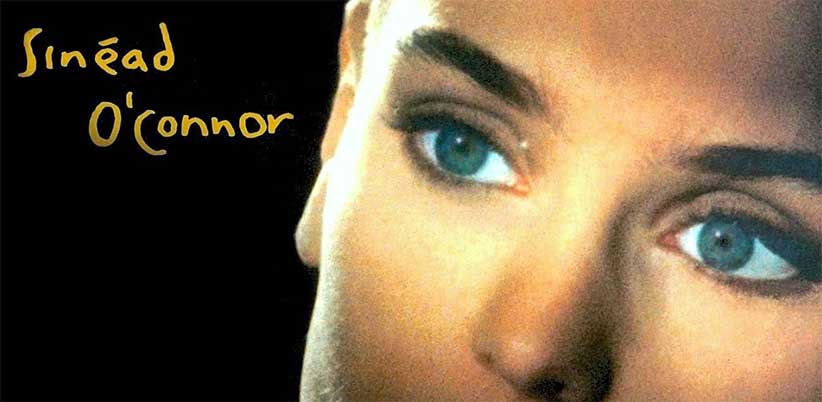
I’m not in the Socialist Equality Party, hosts of WSWS, and while I respect that entity, have a few bones of contention with its worldview. But if you think Trotskyist groups necessarily reductive in their approach to the arts, think again. I first noticed the quality of WSWS’s art criticism in a 2020 post by Verena Nees and Peter Schwarz on why Beethoven still matters.

Now WSWS’s Paul Bond has penned a worthy tribute to the extraordinarily talented, deeply troubled and fearfully courageous spirit that was Sinéad O’Connor.
Sinéad O’Connor (1966-2023)
“Artists can be inspiring as long as we’re courageous enough to be ourselves and to be bullied, but not run away”
The death of Irish singer-songwriter Sinéad O’Connor at just 56 is a sad loss. Genuinely talented, she combined an acute musical and social sensibility to create some extremely moving music of real emotion and passion.
The broadly expressed grief at her passing has highlighted her strengths. Her life was marked by pain and suffering, with devastating effect on her mental health. She was unflinchingly 1 in her honest about her own fragility and torment, but also about abuse and injustice wherever she saw it. She sought to turn this outwards in a wide-ranging musical exploration that took in pop, jazz, reggae, gospel and folk. It did not always work, but when it did it was beautiful.
“Artists can be inspiring,” she once said, “as long as we’re courageous enough to be ourselves and to be bullied, but not run away.” That bullying was real, and O’Connor was frequently pilloried and excluded. The music industry was actively hostile to such independence, and her remarkable talent often went unsupported.
She recognised these pressures, commenting, “The hugest misconception… of ‘Sinéad O’Connor’ is that she is Amazonian. I’m not. I’m a five-ft 4-in soft-hearted female who is actually very fragile.”
While no cause of death has yet been announced, sympathetic responses have stressed the trauma of her life and how many people identified with her. Charlatans singer Tim Burgess tweeted, “Hoping that she has found peace,” and comic Dara Ó Briain wrote, “I hope she realised how much love there was for her.”
Her upbringing was shaped by abuse. Born in 1966, Sinéad grew up in an affluent Dublin suburb, the third child of five. When her parents’ relationship broke up, eight-year-old Sinéad, against her wishes, stayed with her mother Marie, where she suffered extreme and violent physical and emotional abuse.
Marie, who died in a car accident when Sinéad was 18, would stamp and kick her daughter. Sinéad expressed this in songs like “Fire on Babylon” (1994), accusing Marie of taking her family away and “torturing my child.”
Her response was to act in a caring way as no one had acted towards her, as in, “This Is To Mother You.” She felt this as an artistic responsibility: “Our job as artists is to be ourselves. And, in doing so, to inspire other people to be themselves.”
Marie, like many others, piously displayed a photo of the Pope, a photo Sinéad said “represented lies and liars and abuse.” After Marie’s death, Sinéad took the photo, promising to destroy it “when the right moment came.”
“Christianity did nothing but rape the people of Ireland, metaphorically and literally,” she angrily declared. She was hostile to British imperialism and aware of all its crimes in its oldest colony as well as at home. Among the best songs on I Do Not Want What I Haven’t Got is “Black Boys on Mopeds,” a searing condemnation of Thatcherism and its social inequality enforced with police brutality. O’Connor collaborated in memorable performances with Roger Waters on his song “Mother” in 1990 and with Ian Brown on his anti-war single “Illegal Attacks” (2007).
She supported a united Ireland but denounced the “disastrous” role of the church, “which took over” after independence. “Famine” (1994) pointed to the country’s “highest statistics of child abuse in the EEC [European Economic Community]. And we say we’re a Christian country.”
She nevertheless continued to seek solace in religion. In 1999, she was ordained in a breakaway Catholic sect, and five years ago converted to Islam. She embodied Marx’s observation that “Religious suffering is, at one and the same time, the expression of real suffering and a protest against real suffering.”
* * *
- Paul’s calling Sinéad “unflinchingly” honest was picked up by me, in that unconscious plagiarism – it has a name; cryptomnesia – writers and artists are prone to. In my brief intro to his piece I’d echoed that adjective but subsequently changed “unflinchingly courageous” to “fearfully courageous”. This was a woman with no filters; no capacity for self administered anaesthesia in the form of a cynicism most of us have been wearing so long it’s become second nature. Like other real deal artists – Van Gogh springs to mind – the source of her honesty as artist and woman was the piercing vulnerability alluded to in her “I’m no Amazonian” remark.
- Paul closes with a line from Sinéad’s hymnlike, Thank you for hearing me – a gorgeous live rendition of which has featured on this site’s tune for the day slot.

Thanks for this Phil. And that piece was the best tribute I’ve read of the beautiful, intelligent, spirited, gifted, courageous, crazy, creative, troubled, wounded, wonderful Sinéad. I have a deep rapport with her – for obvious reasons. Is breá liom tú agus maireann do spiorad!
Yes, I thought instantly of you while reading the piece Anne. Before deciding to post it, I was going to send it to you anyway.